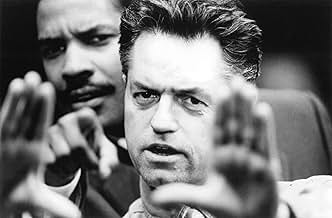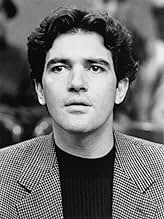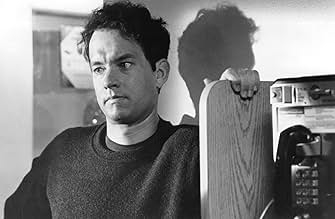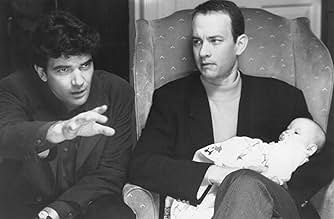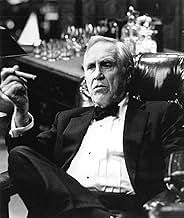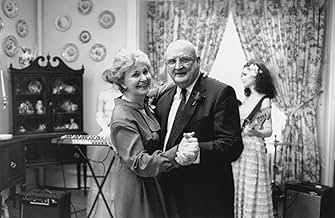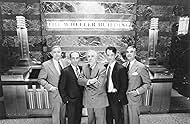Un uomo sieropositivo licenziato dallo studio legale in cui era impiegato a causa della sua malattia, assume un avvocato con pregiudizi nei confronti degli omossessuali per fare causa ai suo... Leggi tuttoUn uomo sieropositivo licenziato dallo studio legale in cui era impiegato a causa della sua malattia, assume un avvocato con pregiudizi nei confronti degli omossessuali per fare causa ai suoi ex datori di lavoro.Un uomo sieropositivo licenziato dallo studio legale in cui era impiegato a causa della sua malattia, assume un avvocato con pregiudizi nei confronti degli omossessuali per fare causa ai suoi ex datori di lavoro.
- Regia
- Sceneggiatura
- Star
- Vincitore di 2 Oscar
- 20 vittorie e 23 candidature totali
- Rachel Smilow
- (as Stephanie Roth)
Trama
Lo sapevi?
- QuizThe moment when Mary Steenburgen's character says that she hates the case was improvised in the moment, when the actress expressed her hate towards her role after shooting the mirror scene and Jonathan Demme encouraged her to incorporate it into the role, so the woman would seem more human.
- BlooperThe court stenographer doesn't seem to be actually typing, and the paper tape recording her keystrokes doesn't ever advance.
- Citazioni
Joe Miller: Have you ever felt discriminated against at Wyatt Wheeler?
Anthea Burton: Well, yes.
Joe Miller: In what way?
Anthea Burton: Well, Mr. Wheeler's secretary, Lydia, said that Mr. Wheeler had a problem with my earrings.
Joe Miller: Really?
Anthea Burton: Apparently Mr. Wheeler felt that they were too..."Ethnic" is the word she used. And she told me that he said that he would like it if I wore something a little less garish, a little smaller, and more "American."
Joe Miller: What'd you say?
Anthea Burton: I said my earrings are American. They're African-American.
- Curiosità sui crediti"This motion picture was inspired in part by Geoffrey Bowers' AIDS discrimination lawsuit, the courage and love of the Angius family and the struggles of the many others who, along with their loved ones, have experienced discrimination because of AIDS."
- Versioni alternativeThe cable and network television versions of Philadelphia edit out portions of the pharmacy scene where a gay University of Pennsylvania law student attempts to pick up Joe Miller. These two versions end this scene with the law student responding "Do I?" to Joe Miller's question concerning whether Miller looked gay. In the theatrical, home video and premium channel versions, Joe Miller continues to berate the law student with bigot remarks regarding homosexuals.
- ConnessioniEdited into Die Geschichte des erotischen Films (2004)
- Colonne sonoreStreets Of Philadelphia
Produced by Bruce Springsteen and Chuck Plotkin
Written and Performed by Bruce Springsteen
Courtesy of Columbia Records
TriStar certainly provided the funds to attract an all-star cast. Tom Hanks portrays brilliant lawyer Andrew Beckett. When Beckett is fired from his high-prestige law firm, no lawyer wants to touch his case for wrongful dismissal. Denzel Washington plays Joe Miller, who agrees to represent Beckett. (Joe is himself uncomfortable with AIDS. However, he knows injustice when he sees it.) Antonio Banderas plays Beckett's loving partner, Miguel Alvarez. Jason Robards is perfectly cast as Charles Wheeler, Beckett's mentor until he becomes Beckett's enemy. All four men are superstars, and it's easy to see why.
The film doesn't just have star power in the leading roles. Great actors like Roberta Maxwell and Joanne Woodward have small supporting roles.
The movie is courageous in facing AIDS directly. In the 1980's and 1990's, people distinguished between "good AIDS" and "bad AIDS." Good AIDS was AIDS that people contracted from blood transfusions. So, the thought was that these people were innocent victims.
Bad AIDS came from (mostly) men having sex with men. In retrospect, we can see the moral error in this good vs. evil judgment. But, at the time, gay sex was considered evil, and many people thought that gay men with AIDS deserved the disease.
How this prejudice played out inside and outside the courtroom represents the plot of the movie. It's very strong and truly heart-wrenching.
We saw this film at the excellent Dryden Theatre at George Eastman Museum in Rochester, NY. It was shown at Rochester's wonderful ImageOut, the LGBT Film Festival. Almost all of the movies shown at ImageOut are new, cutting-edge films. Philadelphia was shown under the heading, "ImageOut of the Archives." The movie was made almost 25 years ago, and it's being shown again to mark that anniversary.
Philadelphia is an important film, and shouldn't be missed. It will work very well on the small screen. Find it and watch it. (Or, as I did, watch it again.)
P.S. Mary Steenburgen has a supporting role as Belinda Conine, the attorney representing Beckett's former law firm. I can't remember when an actor has made so strong an impression in a relatively small role. She's just what you'd expect in this context--brilliant, eloquent, with a heart that has no room for conscience or remorse. She knows that the law firm had dismissed Beckett because he had AIDS. However, that's not going to stop her in the least. It's not even going to slow her down.
I più visti
Dettagli
Botteghino
- Budget
- 26.000.000 USD (previsto)
- Lordo Stati Uniti e Canada
- 77.446.440 USD
- Fine settimana di apertura Stati Uniti e Canada
- 143.433 USD
- 26 dic 1993
- Lordo in tutto il mondo
- 206.678.440 USD
- Tempo di esecuzione2 ore 5 minuti
- Colore
- Mix di suoni
- Proporzioni
- 1.85 : 1
Contribuisci a questa pagina







